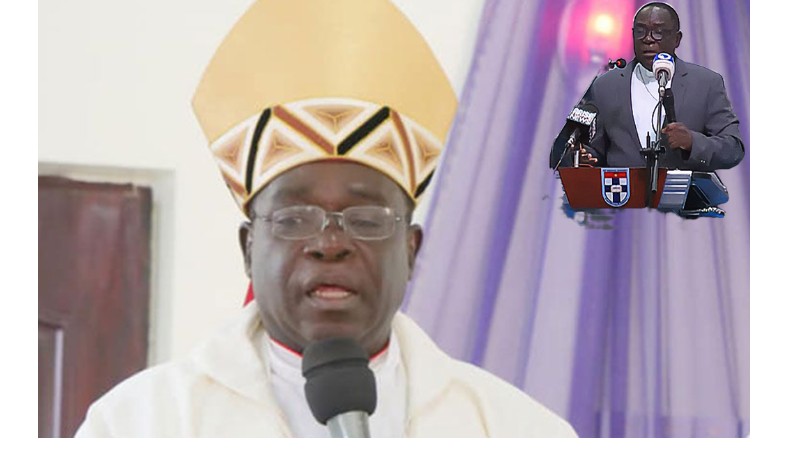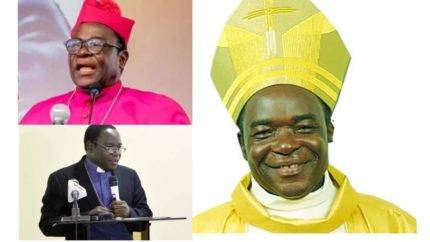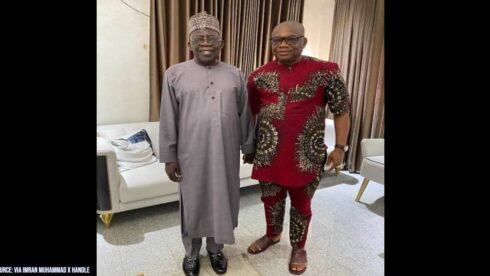Bishop Kukah, a distinguished spiritual figure, urges the youth to consider a departure from the country as a transformative spiritual expedition. Highlighting the essence of personal freedom, he passionately advocates for embracing one’s unique spiritual journey. This narrative resonates with those seeking profound connections beyond geographical constraints, fostering a contemplative perspective on life choices.
Conversely, President Bola Ahmed Tinubu presents a divergent viewpoint, steering the discourse towards the significance of staying rooted and actively participating in the nation’s political landscape. In emphasizing the duty of the youth to contribute to the country’s political evolution, the President counters the notion of spiritual departure, urging a commitment to shaping the collective destiny through civic engagement. These diverging perspectives illuminate the crossroads faced by the youth, inviting reflection on the nuanced interplay between spiritual exploration and political responsibility in their life’s journey.

Bishop Kukah’s Spiritual Road – A Call for Freedom
Bishop Kukah’s profound message strikes a chord with a burgeoning audience of young individuals yearning for a deeper sense of purpose. His spiritual roadmap offers a compelling narrative that goes beyond the mundane aspects of everyday life, encouraging a personal journey towards freedom and self-discovery. This resonates powerfully with those who seek more than the conventional paths laid out for them, igniting a spark of inspiration among the youth to embark on a transformative quest.
Advocates of Kukah’s perspective argue that his call for exploring new horizons, particularly through leaving the country, can serve as a catalyst for profound change. By breaking free from societal constraints, the youth may find a unique opportunity to redefine their identities, aspirations, and ambitions. Kukah’s message thus becomes a beacon for those eager to transcend limitations, fostering a generation ready to embrace the liberating potential of self-discovery on the spiritual road he outlines.
President’s Political Road- Building The Nation’s Future
In the intricate landscape of national politics, President Tinubu champions a vision for the future that hinges on the active involvement of the youth within the nation’s borders. The President emphasizes the transformative potential that arises when the younger generation commits to shaping the political trajectory of the country. This approach, lauded by advocates, underscores the belief that the sustained engagement of youth in politics can serve as a catalyst for positive change, ultimately laying the foundation for a brighter and more prosperous future for both the present and future generations.
By urging the youth to remain and actively participate in political affairs, President Tinubu not only encourages a sense of civic responsibility but also underscores the crucial role young individuals play in nation-building. This vision, articulated with conviction, positions the President as a catalyst for change, fostering an environment where the collective efforts of the youth contribute significantly to the advancement of the nation’s political landscape. In aligning with President Tinubu‘s call to action, a commitment to shaping the nation’s future emerges, with the conviction that the collaborative efforts of the youth will be pivotal in navigating the intricate path toward progress and prosperity.
Public Reaction and Divergent Opinion
In the midst of a national discourse, the public’s reactions to the divergent messages presented by Bishop Kukah and the President have unfolded in a multifaceted manner. Embracing Bishop Kukah’s spiritual approach, a segment of the population finds solace in his perspective, attributing significance to the moral and ethical dimensions of the discourse. Concurrently, another faction aligns itself with the President’s political stance, advocating for a pragmatic approach to address societal issues. This divergence in opinions has not only sparked intense debates in traditional forums but has also amplified on social media platforms, showcasing the nation’s profound division on the appropriate course of action for the youth.
The dynamic exchanges on social media serve as a microcosm of the broader public sentiment, highlighting the complexity of views surrounding the matter. The platform’s role in shaping and reflecting societal perspectives underscores the need for nuanced discussions that consider both spiritual and political dimensions. As the discourse unfolds, the nation grapples with reconciling these conflicting opinions, emphasizing the importance of fostering a constructive dialogue that bridges the gap between differing worldviews for a more cohesive societal narrative.
Considerations for the Youth
Navigating the delicate balance between spiritual freedom and political responsibility is a pivotal challenge for today’s youth. As they grapple with this influential guidance, young individuals stand at a crossroads, faced with decisions that extend beyond personal choices. The choices made in this critical juncture have the potential to shape not only their individual destinies but also hold significance in contributing to the broader narrative of the nation’s future. By delving into the complexities of this dilemma, young people can play a crucial role in molding the societal discourse, steering it towards a path that harmonizes personal beliefs with civic duty, thereby impacting the collective trajectory of their generation.
In the ever-evolving landscape of societal expectations, it becomes imperative for the youth to reflect on how their decisions resonate within the political and spiritual spheres. Balancing these elements requires a nuanced understanding of the interconnectedness between personal autonomy and communal obligations. By engaging in thoughtful introspection, the youth can cultivate an awareness that not only empowers them individually but also fosters a sense of responsibility towards the broader societal tapestry. This dual perspective positions them as active contributors to the shaping of their nation’s destiny, ensuring that the decisions made today resonate positively in the unfolding chapters of the country’s collective story.
Moving Forward – An Ongoing Dialogue
The clash between spiritual guidance and political responsibility sparks an essential conversation about the role of faith and politics in shaping individual and collective destinies. As the nation navigates these conflicting perspectives, the youth face the challenge of making a choice that aligns with their values and aspirations while contributing to the evolution of their country.
In a nation at the crossroads, the youth find themselves torn between the spiritual insights of Bishop Kukah and the political guidance of President [President’s Name]. The ensuing dialogue reflects a deeper conversation about personal freedom, political responsibility, and the complex interplay between spirituality and governance. The ultimate choice rests with the youth, as they weigh the potential outcomes of the paths laid before them.
Table of Contents
Discover more from OGM News NG
Subscribe to get the latest posts sent to your email.














